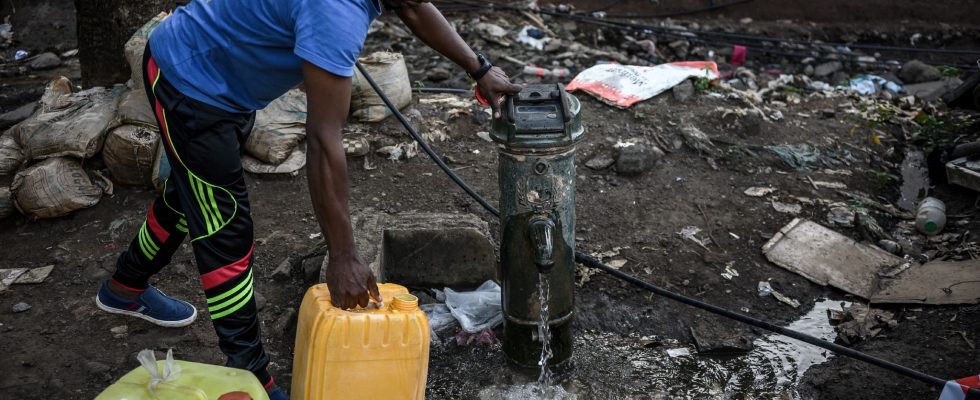The government announced, Thursday, October 5, several measures to try to stem the most serious water crisis that Mayotte has experienced, due to drought and aggravated by a long-standing lack of infrastructure and investment.
The State will cover from September to December the water bills of the 310,000 inhabitants of this small French archipelago in the Indian Ocean, deprived of water two days out of three for a month, announced Elisabeth Borne at the resulting from an interministerial meeting on the subject.
This decision, taken taking into account “the very significant deterioration of the service provided to the public”, was welcomed by several stakeholders, even if some are already highlighting its limits, given the extent of the difficulties that Mayotte is facing.
“In the slums for example, how can we reach this audience?” asks RMC Ahmed Nadjib, spokesperson for a student union in Mayotte. “They are dying of thirst in their corner because no one is interested. They have no help. We have to buy water packs specifically dedicated to this public because the others manage to get by. obtain in stores.”
Paying water bills will cost the State 12 million euros, said on franceinfo the Minister Delegate in charge of Overseas Territories, Philippe Vigier, who promised that it would be renewed “in January if the water has not returned to the tap regularly”.
Still “six to eight weeks” difficult
The government also plans to “gradually expand” until mid-November the distribution of free bottled water, currently limited to 50,000 of the most vulnerable people, thanks to more deliveries of bottles from Reunion Island. and France. Some “110,000, 120,000 people” will be affected, indicated Philippe Vigier.
Some 300 soldiers and civilians will be deployed to Mayotte to ensure the logistics of this distribution, including 50 education assistants in schools. In addition, 30 nursing staff will strengthen the workforce at the Mamoudzou hospital center “in the coming days”, and an “aid system” for businesses affected by these shortages will be put in place “during November”.
To deal with the crisis, the State has intensified water cuts and is considering extending them further, anticipating a difficult “six to eight weeks”. The poorest department in France is facing its worst drought since 1997, while its supply depends largely on rainwater. Rainfall deficits are aggravated by a lack of infrastructure and investment in a territory which, under pressure from illegal immigration particularly from the neighboring Comoros, is experiencing demographic growth of 4% per year.
“Significant liability”
The payment of water bills is “good news”, declared to AFP Sylviane Amavi, member of the Mayotte 2018 collective, a group defending the interests of the Mahorais, marked on the right.
“It will be good for our wallet, families will be able to have more purchasing power, given the staggering cost of bills. Especially since we have to buy bottles of water now,” explains She. Water packs are currently sold for between 5 and 10 euros in Mayotte.
Mahorese MP Estelle Youssouffa (Liot) would like the measure on invoices to be “retroactive”. “There are still significant liabilities and the disruption in service, for which the government decides to freeze these invoices, does not date from September,” she reacted to AFP.
While estimating on “We need a much more substantial mobilization. For a long time, the authorities raised their hands to the sky to pray for rain. And then there was an underestimate of the seriousness of the situation,” he accused from the AFP.
The two hill reservoirs (water storage structures), which normally provide 80% of the supply, with the rivers, are almost dry. When their emptying is complete, during October, the Mahorais territory will only be able to count on its rivers, its groundwater and on the production of its desalination plant, while waiting for the rainy season to recharge the reserves from November. And “it will take time to replenish the hill reservoirs”, recently warned the prefect in charge of water in Mayotte, Gilles Cantal. Emergency work has been undertaken (drilling, leak detection, network interconnection, etc.) but should only bear fruit in the longer term. The construction of a second desalination plant and a third hill reservoir project are also planned.
